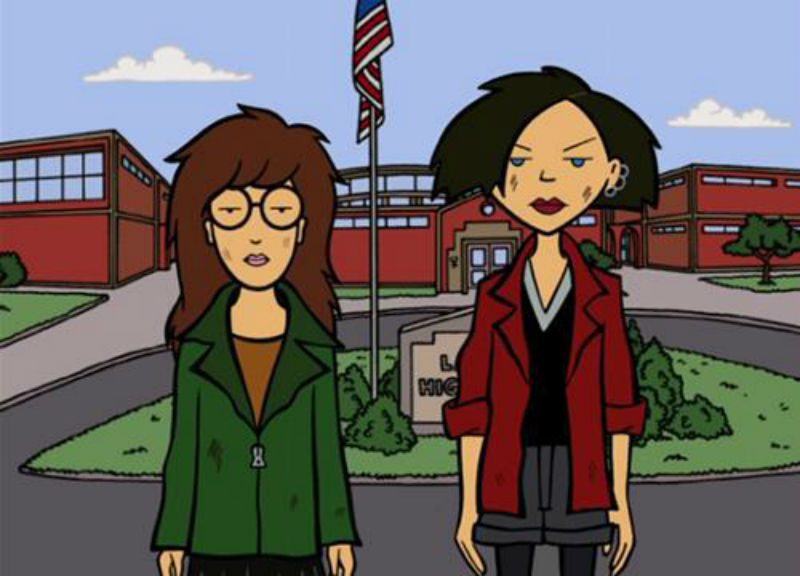These ladies defied gender norms and sexist stereotypes to bring feminism to young girls.
Third-wave feminism is a 90s kid. Born of the RiotGrrl movement in early-90s in Washington (State and DC), it was the first of the feminism moments to go intersectional; fighting for the rights of LGBTQ+ people and people of colour. The focus of the movement was women in the workplace, gender violence and reclaiming sexist slurs.
As 90s kids grew up, we were exposed to feminism through plenty of the media that we consumed, even as children (i.e. The Spice Girls). So, who were some of the biggest outspoken feminists on our screens back then?
Daria (Daria)
Daria was a smart, independent woman who did what she wanted and (most of the time) didn’t care what other people thought of her.
Some people will tell you that because Daria isn’t the bubbly, enthusiastic cheerleader type that she gives feminists a bad name; embodying the man-hating, bra-burning stereotype. Nonsense. Daria doesn’t hate men; she hates everyone.
But yeah, I get the problem; it’s not great that she mocks her sister Quinn for her interest in fashion or her classmate Brittany for her interest in cheerleading. Feminists can cheer for their sports team and wear fuzzy pink sweaters without sacrificing their belief in gender equality.
As a whole, the show was incredibly progressive, tackling topics like race (Partner’s Complaint, I Loathe a Parade), gender roles in employment (It Happened One Nut), body image (Fat Like Me, Arts ‘n’ Crass, The Lost Girls). In fact, the show was one of the few I saw on TV in the late 90s/early 00s that would have passed the Bechdel test in every episode; with the two female leads much preferring to discuss music, art, politics, religion over boys.
Kat Stratford (10 Things I Hate About You)
Ever since I first watched 10 Things, I wanted to be Kat. She didn’t apologise for her beliefs and, in fact, smiled after being called a heinous bitch by the guidance counsellor.
This movie was based on The Taming of The Shrew, but Kat was not for taming. She didn’t give up on her top choice school to please her father, she didn’t change her views in order to make herself more appealing to Heath Ledger’s character and she even sparked a feminist revolution in her little sister who punched out the boy who took advantage of Kat a few years earlier.
Topanga (Boy Meets World)
Topanga is one of the ultimate 90s feminists (and on the Disney Channel too). She was body-positive before it was a thing (Hair Today, Goon Tomorrow, Cory’s Alternative Friends), she called people out on their sh*t (This Little Piggy, Life Lessons) and she knew she could do anything that a boy could do; especially when it came to getting more As than Minkus (The Eskimo).
Some people will tell you that Topanga isn’t a feminist because she gave up going to Yale so that she could marry Cory but these people aren’t telling you the full story. Topanga proposed and, while she may have given up Yale to stay with her fiancé, she still went to college. In the series finale, she took Cory with her to New York when she got a job offer. Also, ICYMI, in the reboot series, Girl Meets World, Topanga kicks some serious ass as a top lawyer.
Now granted, Topanga wasn’t the main focus of the show (it is called Boy Meets World after all) but she really stole the show for me.
Wednesday Addams (Addams Family Values)
Wednesday wouldn’t be your ideal bunkmate at summer camp but she shows incredible strength holding out against the wills of camp counsellors Gary and Becky who want her to be peppy and smiley like fellow camper Amanda.
During the camp play, she takes the time to explain to the WASPy audience that the first Thanksgiving wasn’t as amicable as they might like to believe, calling out their treatment of the Native Americans, before burning the whole thing to the ground.
Granted, the depiction could have been less stereotypical but that was a pretty bad-ass thing to show in a kids movie.
Lisa Simpson (The Simpsons)
Lisa may only be eight but she’s one of the best intersectional feminist icons that 90s TV had to offer, caring about women’s rights, LGBTQ+ rights, and the environment. With her big brains, strong principles, and emotional realness, she taught millennials that it’s okay to be smart (They saved Lisa’s Brain, Girls Just Want to Have Sums), it’s okay to care about things even when no one else seems to (Lisa vs. Malibu Stacy, Mr Lisa Goes to Washington) and that it’s okay not to live up to your own standards all the time (Lisa the Treehugger, Little Big Girl).
She also regularly rejects the idea of getting married (The Haw-Hawed Couple)and in flash-forwards that may or may not be canon, she is shown in a relationship with a woman (and a polyamorous relationship with two women).
Plus, let’s not forget that Lil’ Lisa Simpson is going to clear up the mess caused by the Trump administration. So #Lisa2020, anyone?
